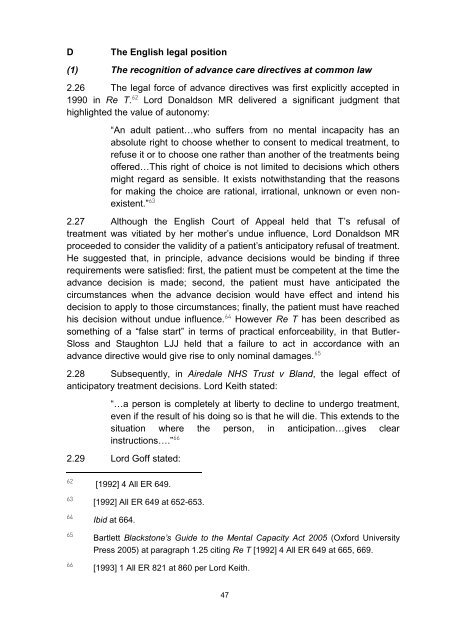Consultation Paper on Bioethics - Law Reform Commission
Consultation Paper on Bioethics - Law Reform Commission
Consultation Paper on Bioethics - Law Reform Commission
Create successful ePaper yourself
Turn your PDF publications into a flip-book with our unique Google optimized e-Paper software.
D The English legal positi<strong>on</strong><br />
(1) The recogniti<strong>on</strong> of advance care directives at comm<strong>on</strong> law<br />
2.26 The legal force of advance directives was first explicitly accepted in<br />
1990 in Re T. 62 Lord D<strong>on</strong>alds<strong>on</strong> MR delivered a significant judgment that<br />
highlighted the value of aut<strong>on</strong>omy:<br />
“An adult patient…who suffers from no mental incapacity has an<br />
absolute right to choose whether to c<strong>on</strong>sent to medical treatment, to<br />
refuse it or to choose <strong>on</strong>e rather than another of the treatments being<br />
offered…This right of choice is not limited to decisi<strong>on</strong>s which others<br />
might regard as sensible. It exists notwithstanding that the reas<strong>on</strong>s<br />
for making the choice are rati<strong>on</strong>al, irrati<strong>on</strong>al, unknown or even n<strong>on</strong>existent.”<br />
63<br />
2.27 Although the English Court of Appeal held that T‟s refusal of<br />
treatment was vitiated by her mother‟s undue influence, Lord D<strong>on</strong>alds<strong>on</strong> MR<br />
proceeded to c<strong>on</strong>sider the validity of a patient‟s anticipatory refusal of treatment.<br />
He suggested that, in principle, advance decisi<strong>on</strong>s would be binding if three<br />
requirements were satisfied: first, the patient must be competent at the time the<br />
advance decisi<strong>on</strong> is made; sec<strong>on</strong>d, the patient must have anticipated the<br />
circumstances when the advance decisi<strong>on</strong> would have effect and intend his<br />
decisi<strong>on</strong> to apply to those circumstances; finally, the patient must have reached<br />
his decisi<strong>on</strong> without undue influence. 64 However Re T has been described as<br />
something of a “false start” in terms of practical enforceability, in that Butler-<br />
Sloss and Staught<strong>on</strong> LJJ held that a failure to act in accordance with an<br />
advance directive would give rise to <strong>on</strong>ly nominal damages. 65<br />
2.28 Subsequently, in Airedale NHS Trust v Bland, the legal effect of<br />
anticipatory treatment decisi<strong>on</strong>s. Lord Keith stated:<br />
“…a pers<strong>on</strong> is completely at liberty to decline to undergo treatment,<br />
even if the result of his doing so is that he will die. This extends to the<br />
situati<strong>on</strong> where the pers<strong>on</strong>, in anticipati<strong>on</strong>…gives clear<br />
instructi<strong>on</strong>s….” 66<br />
2.29 Lord Goff stated:<br />
62 [1992] 4 All ER 649.<br />
63 [1992] All ER 649 at 652-653.<br />
64 Ibid at 664.<br />
65 Bartlett Blackst<strong>on</strong>e‟s Guide to the Mental Capacity Act 2005 (Oxford University<br />
Press 2005) at paragraph 1.25 citing Re T [1992] 4 All ER 649 at 665, 669.<br />
66 [1993] 1 All ER 821 at 860 per Lord Keith.<br />
47

















